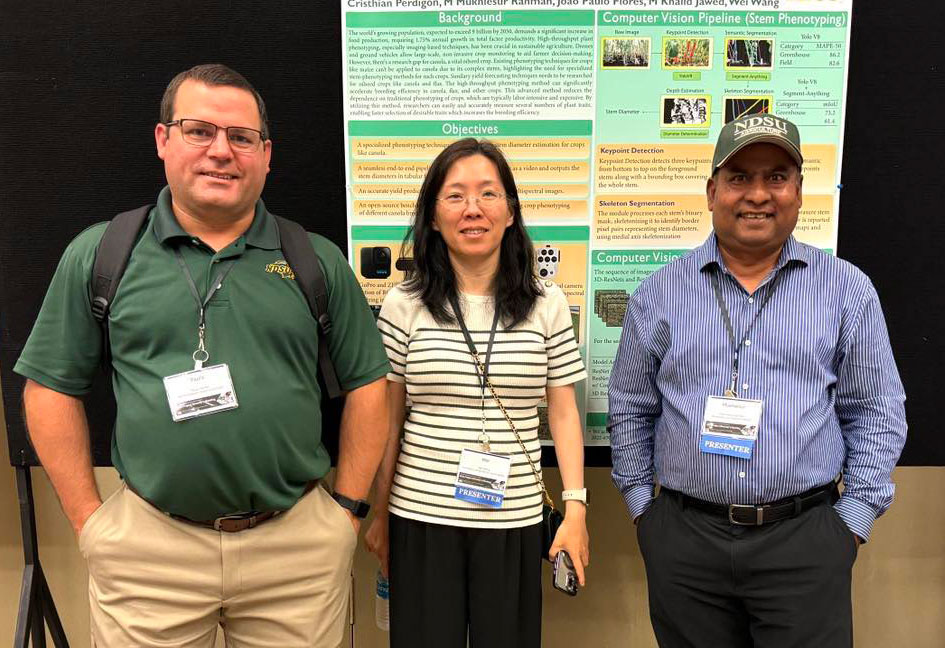Rahman’s research on precision agriculture a collaborative work

Mukhlesur Rahman, North Dakota State University associate professor of plant sciences, is conducting collaborative research in the area of precision agriculture thanks to three grants funded from the United States Department of Agriculture’s National Institute of Food and Agriculture. Using artificial intelligence, robotics and agriculture science, Rahman and core collaborators at NDSU and beyond are directing their energy to address critical challenges in precision agriculture, including autonomous weed management, prediction of yield and agronomic traits, and 3-D scene reconstruction of agricultural farms.
Rahman worked with M. Khalid Jawed, UCLA associate professor of mechanical and aerospace engineering and Wei Wang, UCLA professor of computer science to secure $1.83 million in USDA-NIFA funding for the three projects.
The most recently awarded project, “AI-based Fast Automated 3D Scene Reconstruction of Plants and Farms for Agricultural Robots,” received $727,999 in 2024. The objective of this research, which is co-led by Rahman, is to design, develop, and field-test an integrated system for real-time 3D reconstruction of farming environments.
“Year in and year out, NDSU plant breeders like Dr. Rahman deliver public crop varieties with traits designed to put money in the pockets of North Dakota ranchers,” said NDSU vice president for research Colleen Fitzgerald. “Through these multidisciplinary collaborations with computer scientists, aerospace engineers and precision agriculture researchers, he is taking the potential of those varieties up a notch by the value added with emerging technologies like machine learning, artificial intelligence, and virtual reality.”
This interdisciplinary project integrates computer vision, machine learning, and unmanned ground vehicles to create dynamic virtual reality (VR) models of agricultural farms. These VR environments will simulate crop life cycles, seasonal changes, and various agricultural scenarios. The goal is to provide breeders, agronomists, and roboticists with innovative tools for analysis, planning, and decision-making, ultimately advancing agricultural research and practices.
A second project, “Harnessing Data for Accurate Yield and Oil Content Prediction,” received $650,000 in 2022, is co-led by Wei Wand (UCLA), Rahman, Jawed, and Paulo Flores, NDSU assistant professor of agricultural and biosystems engineering.

It aims to advance flax breeding through the integration of artificial intelligence and robotics. This project is focused on developing an AI-driven framework to predict flax yield, seed oil content, and other agronomic traits prior to harvest, thereby accelerating selection efficiency in the breeding program. By utilizing unmanned aerial vehicles and ground vehicles equipped with advanced sensors such as multispectral cameras, the project collects precise crop data to build machine learning models for predicting yield, oil content, stem diameter, and crop density of canola.
A third project, awarded $453,190, is titled “Autonomous Robotic Systems for Precision Weed Control in Flax,” with Rahman as the PI.
Most existing robotic systems are not fully autonomous and are unsuitable for row crops like flax and canola, which typically have row spacing of less than one foot. Jawed has developed a small, compact, fully autonomous robot capable of navigating tight crop rows, identifying weeds, and applying herbicides with precision. This innovation significantly reduces herbicide use, minimizes environmental impact, and lowers costs. Mohiuddin Quadir, NDSU associate professor of coatings and polymeric materials, is also working on this project by encapsulating herbicides into nanomaterials to enhance their efficiency.
USDA-NIFA Funding Awards
- Award# 2024-67021-42528
- Award# 2022-67022-37021
- Award #2021-67022-34200
The NDSU Food, Energy and Water Security (FEWS) initiative projects receive funding from the United States Department of Agriculture’s Agricultural Research Service.


